Alaska Last Will and Testament
An Alaska last will is a legally binding document that conveys the testator’s last wishes in the form prescribed by the state laws and establishes the lawful distribution of the will’s creator’s assets upon their passing.
Even if you don’t have too many assets, a last will and testament can help your family situation and be crucial to your close relatives after your death.
In case you’re interested in a fillable and printable will form, you will find it on this page, in addition to the guidelines on the last will writing process and answers to frequent questions.
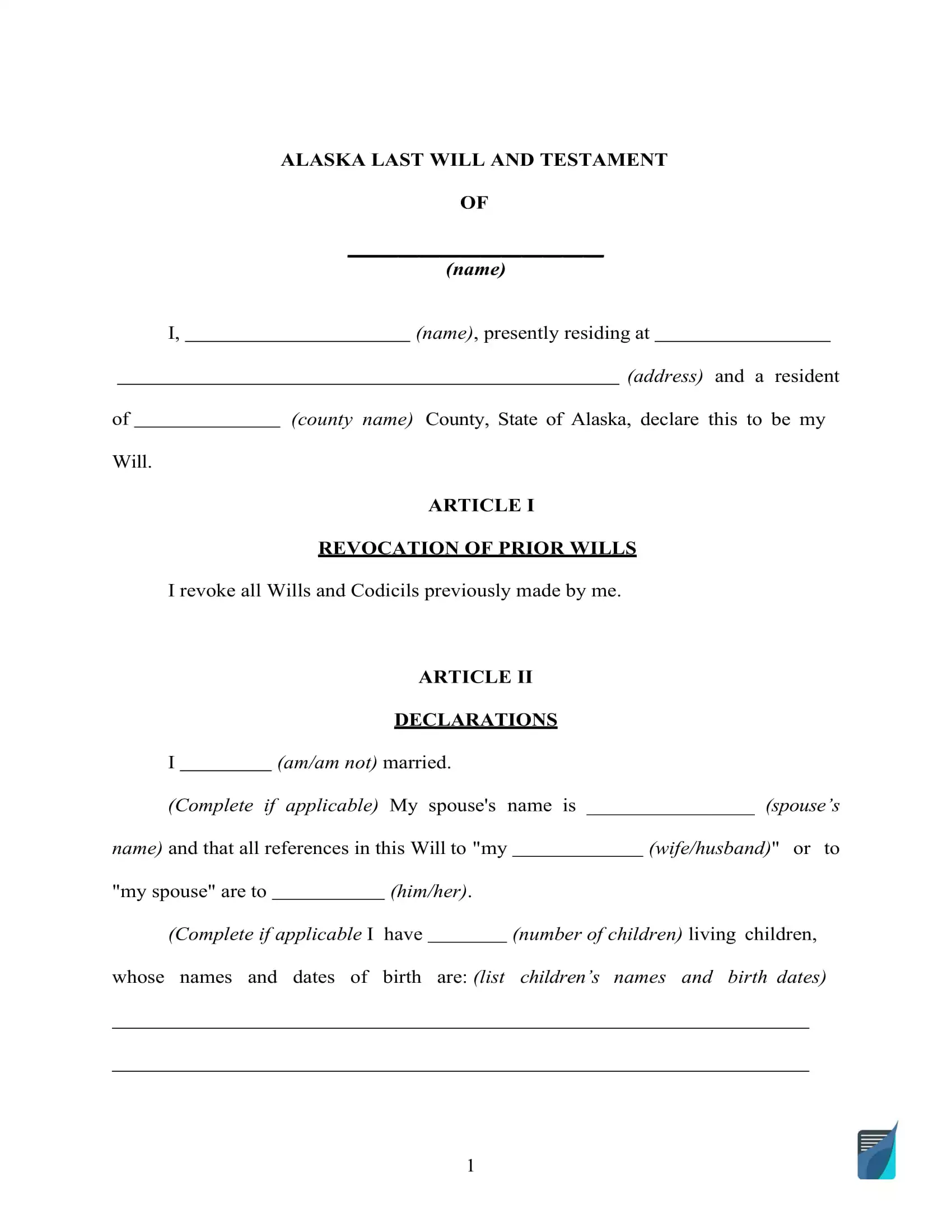
Build Your Document
Answer a few simple questions to make your document in minutes
Save and Print
Save progress and finish on any device, download and print anytime
Sign and Use
Your valid, lawyer-approved document is ready
Alaska Last Will Laws and Requirements
| Requirements | State laws | |
| Statutes | Title 13 – Decedents’ Estates, Guardianships, Transfers, Trusts, and Health Care Decisions; Chapter 12 – Intestacy, Wills, and Donative Transfers | |
| Signing requirement | Two witnesses | Sec. 13.12.502. Execution |
| Age of testator | 18 and older | Sec. 13.12.501. Who may make will |
| Age of witnesses | Sec. 13.12.505. Who may witness | |
| Self-proving wills | Allowed | Sec. 13.12.504. Self-proved will |
| Handwritten wills | Recognized if meeting certain conditions | Sec. 13.12.502. Execution; witnessed wills; holographic wills |
| Oral wills | Not recognized | |
| Holographic wills | Recognized if meeting certain conditions | |
| Depositing a will | Possible with the clerk’s office in an Alaska Superior court. A fee is $50.00 | Sec. 13.12.515. Deposit of will with court in testator’s lifetime |
How to Make an Alaska Last Will
1. Consider your possible choices. Before starting, you’ll want to decide if you would like to use the help of a lawyer or prepare the entire document by yourself. In the event that you wish to prepare the last will and testament on your own, select the type you will go for: a handwritten, holographic will, or a free will template.
2. Indicate your details. The first step is establishing the testator by providing their full legal name, together with the residential details (city, county, and state). Review the details you entered as well as the remainder of the section, including “Expenses and Taxes.”
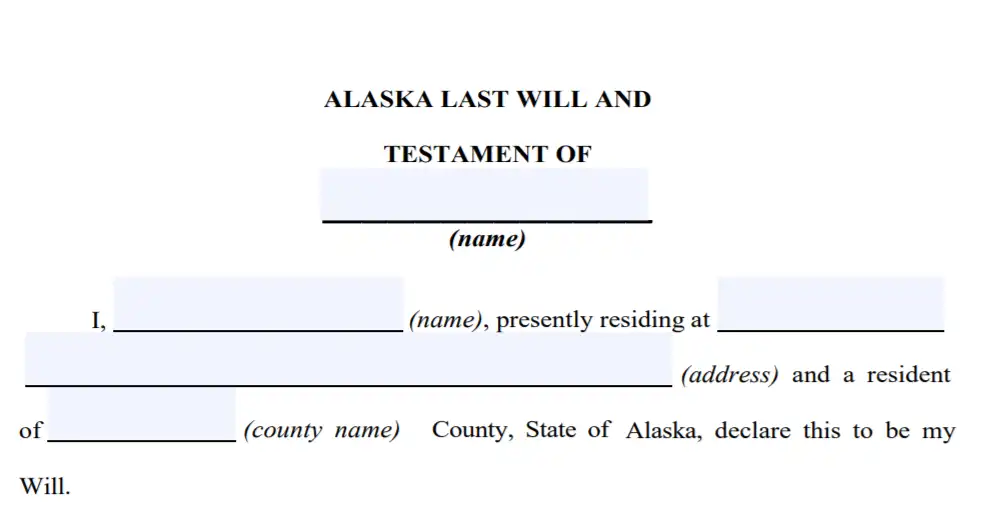
3. Indicate the executor. In this particular passage, you determine who will execute your last will and testament by entering their full legal name, as well as their city, county, and state of residence. Nearly all states have special rules associated with out-of-state agents and executors, which in most cases means extra hassle and red tape. For that reason, it is recommended to designate someone who resides in the same state as you. It may well happen that the primary representative will be unable to carry out your will as a result of a health problem, passing, unwillingness, or other factors. In such a case, the court will choose its own representative to handle the responsibilities. To prevent that, you should decide on an additional executor by specifying the same information you did for the first one.
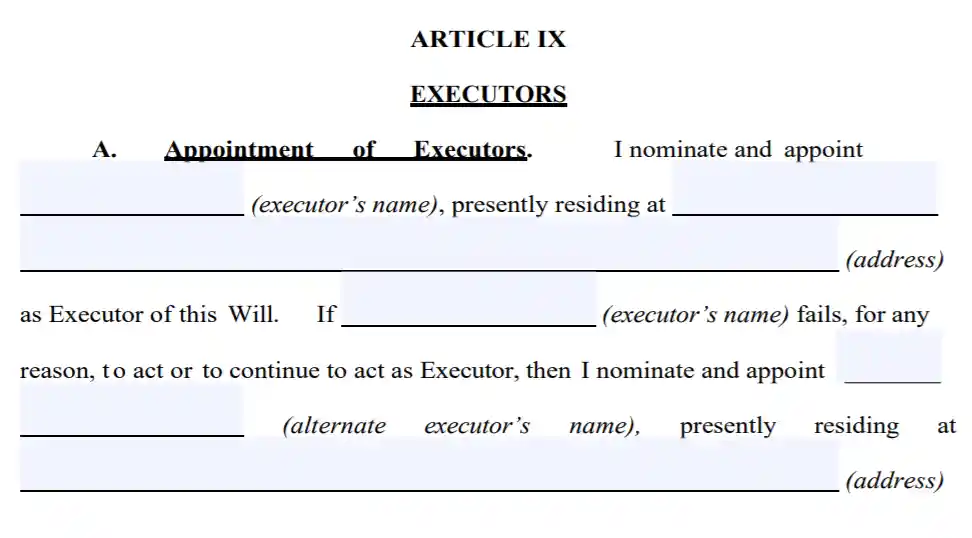
4. Appoint the guardian (optional). Should you have minor or dependent children and don’t wish the court to pick a guardian for them when you are no longer here, it’s possible to choose a friend or acquaintance as a guardian for your children.
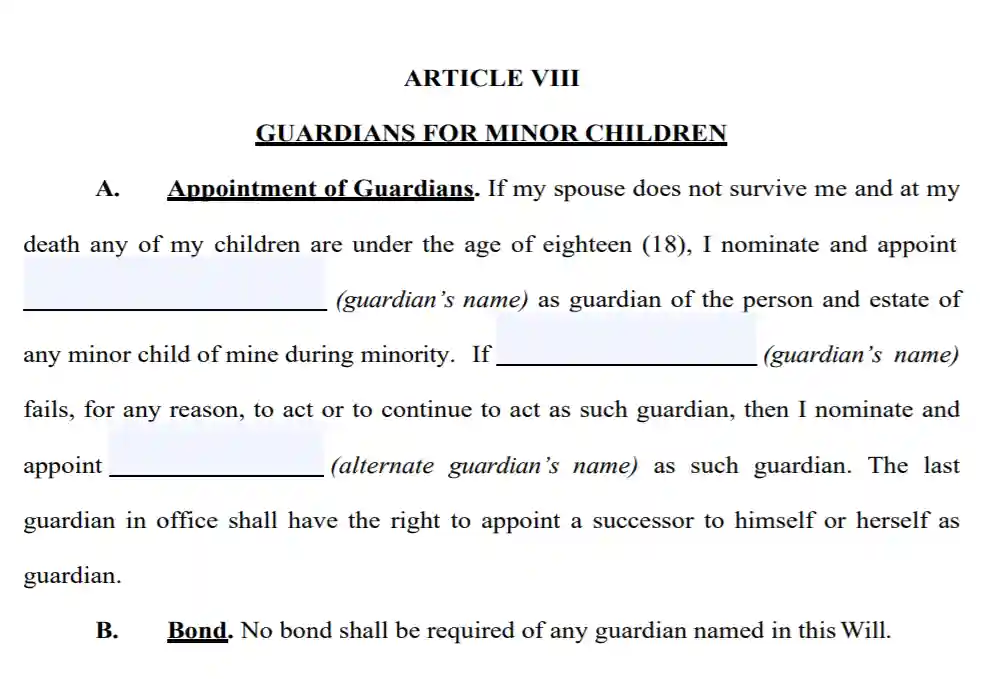
5. Indicate your beneficiaries. Now indicate individuals to whom you would like to hand your property on, that is, your beneficiaries. For each named beneficiary, enter the next details: full legal name, address, and the way they are related to you.
6. Designate possessions. When you have an asset allocation in mind that is not proportional, it’s possible to describe it in this part. Assets could include money for unpaid debts, realty, shares, company control, cash, and any physical items of monetary value you possess. Yet, shared and living will property, as well as your life insurance, can’t go in your will.
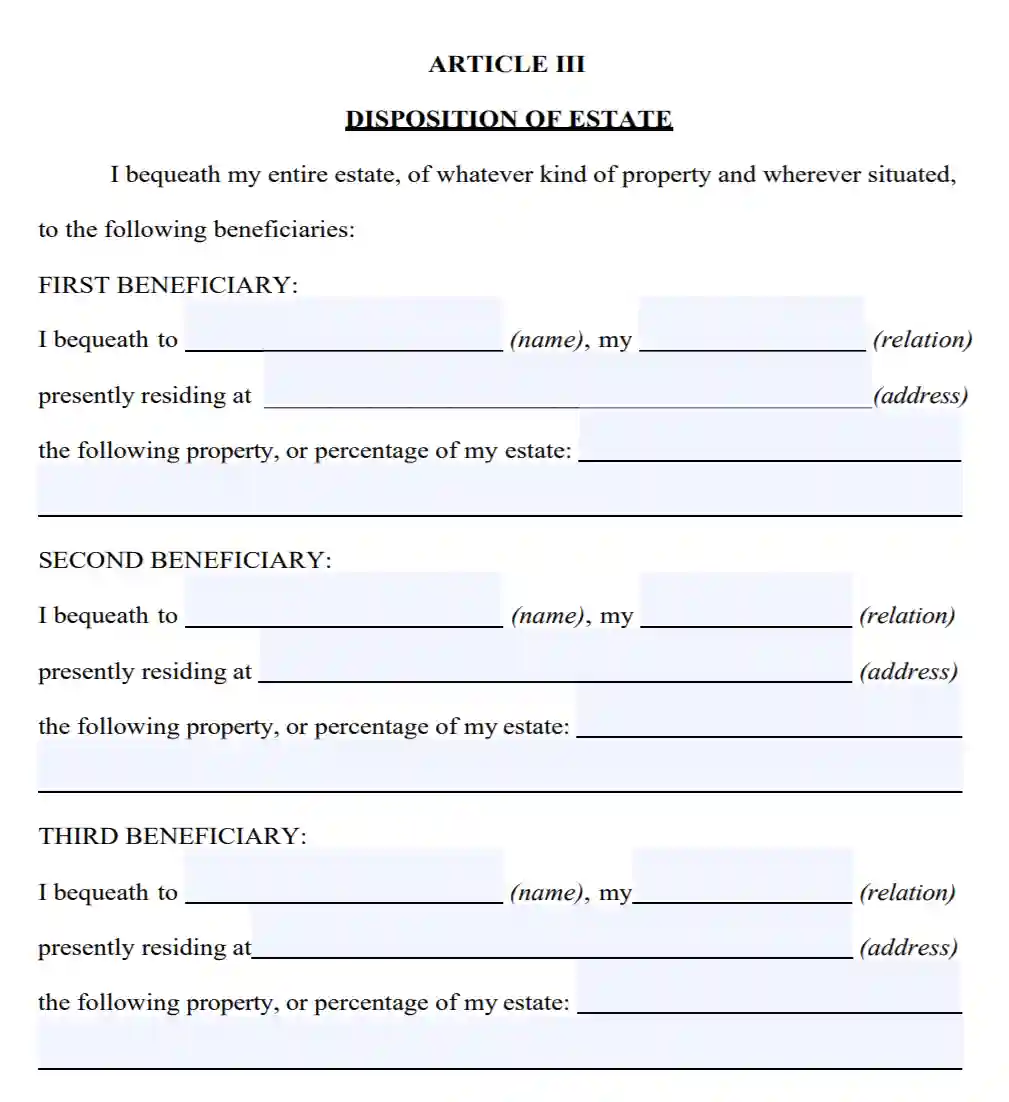
7. Ask witnesses to finalize the document. According to Alaska regulation, for a will to be valid, it must be signed by two witnesses. You can name a person as a witness as long as they are older than 18 years and are not included in the heritage. Consider choosing witnesses who are younger than you to ensure that they will likely be around in the event the will is contested in the court or if some other problem arises. At this point, you (as well as your two witnesses) have to sign the document after writing your full legal addresses and names. Don’t neglect to examine each sentence thoroughly prior to finalizing the matter.
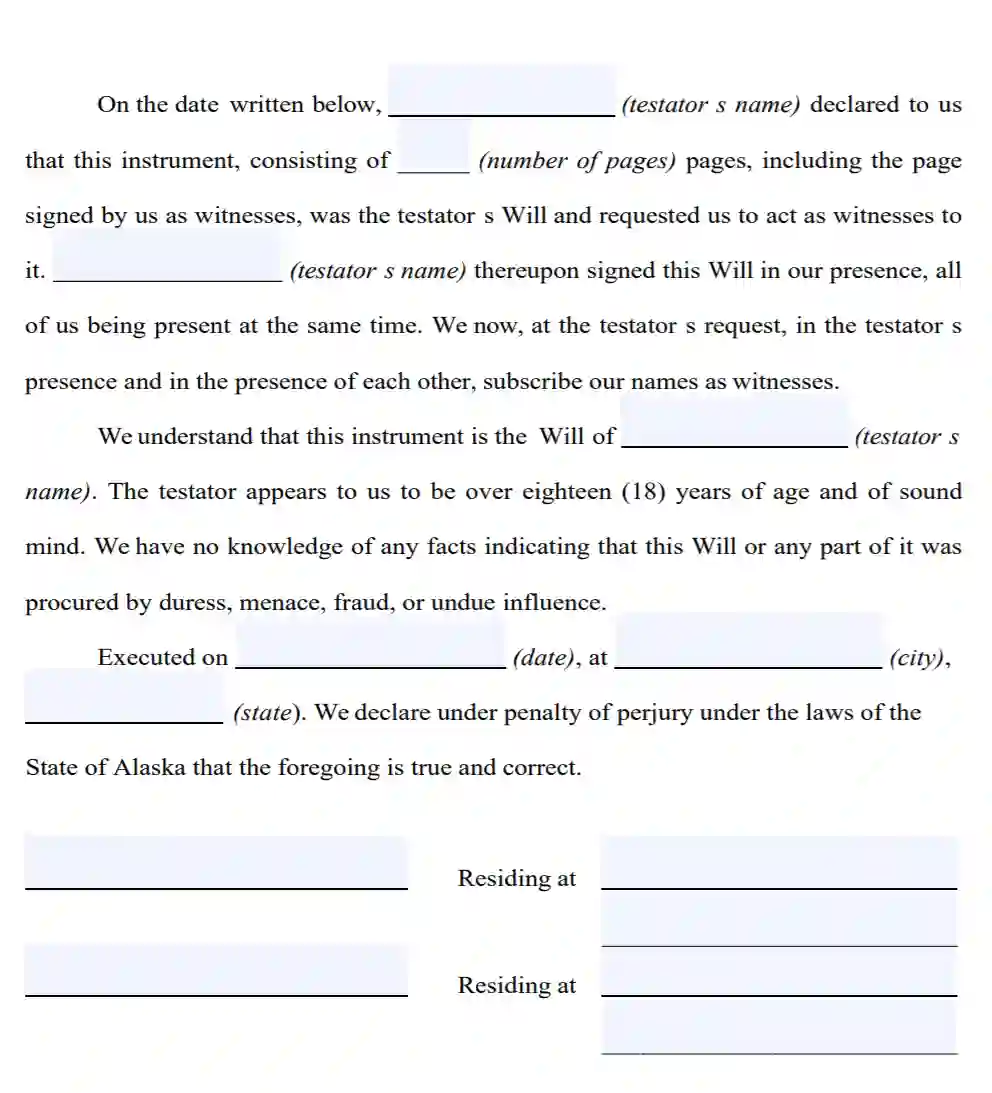
Create a Free Alaska Last Will and Testament
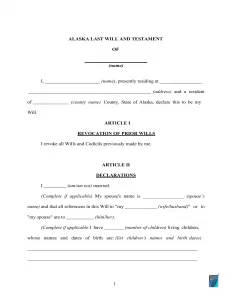

Frequently Asked Questions
Must I notarize my last will in Alaska for it to be valid?
A last will in Alaska is valid without notarization. Even so, it is possible to make your will self-proving by attaching an affidavit to it, and you will need to hire a notary if you want to do that. In the event that you make your will self-proving, the court won’t have to make contact with the witnesses to determine the legality of the document, which will expedite the probate.
In Alaska, will I need a self-proving affidavit?
No, in Alaska, there is no such prerequisite. Still, attaching one might be very useful as it eliminates the demand for witnesses’ testimony at the time of probate, which eases the process considerably.
Is it allowed to disinherit your child or spouse?
In Alaska, there is such a term as community or marital property. It implies that all the belongings collected or increased during the marriage must be evenly shared between both marriage partners, and this can make it almost implausible to disinherit your spouse.
Only the belongings you control (your separate property) are subject to will disinheritance when it comes to your marriage partner.
Well before getting married to someone, you can enter into a prenuptial contract with your partner. It will allow you to alter the way how the community property ought to be allocated on divorce or your demise. This is probably the sole plausible way to disinherit your marriage partner or reduce her or his share.
Aside from your husband or wife, Alaska law makes it possible to disinherit other members of your family. This applies to your children and any other family members; just include disinheritance provisions to the last will and testament.
Can a signed, typewritten will be altered in Alaska?
Yes, you can alter it.
A person who wrote the will is allowed to alter or revoke their last will and testament at any time. The sole situation that won’t allow you to do it is when such doing is outlawed under the contract you concluded.
It’ll also be wise to update your last will and testament in the following situations:
- Adoption or birth of a child
- You have married or divorced
- You sold or purchased real estate or a major piece of property
- Significant changes in your money situation
What should I do in case my last will has been lost?
Alaska law implies that a will can be accepted in case it’s lost or destroyed. But, just the original of the will is likely to be approved by the probate court.
Based on Alaska law, the absence of the will may be assumed as its annulment. This means the executor must prove the last will and testament’s credibility, which might be found to be quite complicated.
For a holographic will, you would need sworn witnesses and testimony to demonstrate. That will make the situation much more difficult. The cause for not producing the will and its contents is be proven as well.
What does one have to do in case they cannot physically sign his or her last will and testament?
Alaska Estate Code enables another individual to sign your will solely per your directive and with you present. It’s possible to give a particular directive in some ways, including speaking, a positive response to a question, or a gesture.
A notary public can sign the testator’s name in case the testator isn’t able to do it on account of a physical disability. The notary must be guided to perform it in the presence of a witness. This witness is chosen just like someone could select an executor – they must not have any legal or equitable interest in any property being the subject of or influenced by the last will.
Other Documents Related to Wills in Alaska
| Related documents | Instances when you may want to have one |
| Codicil | There are a few minor changes you want to make to your will. |
| Self-proving affidavit | You need to expedite the probate in the future. |
| Living will | You want to state your wishes concerning the end-of-life treatment and life-prolonging measures. |
| Living trust | You want more protection and confidentiality once the time to distribute your possessions comes. |
Last Will and Testament Forms for Other States
